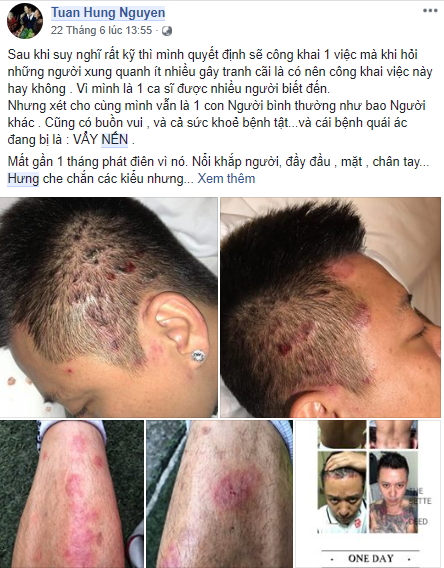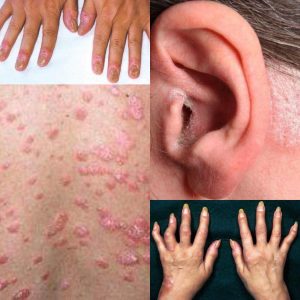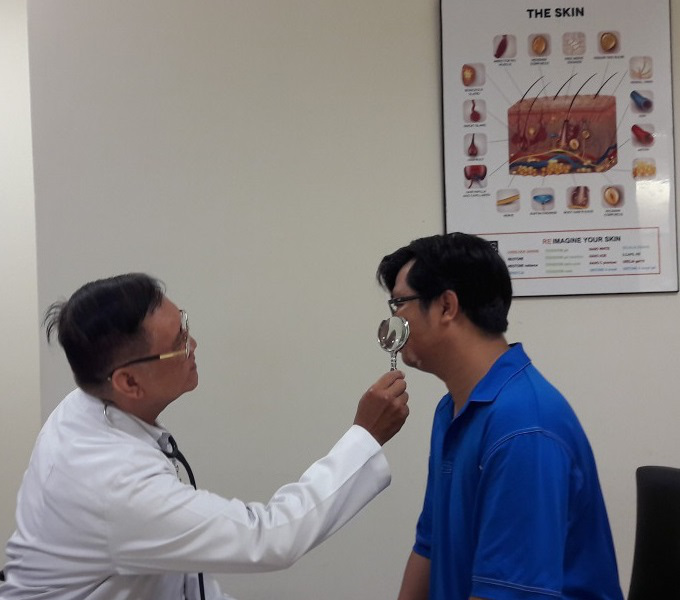Tuan Hung, a famous singer, a while ago shared on social media posting about his current status after being diagnosed with Psoriasis and how dealing with it has been driving him crazy. He has been very open with his struggle with psoriasis and even posted pictures of his psoriasis flare-ups. An uncomfortable and often painful disease physically and emotionally that can make even the most confident people want to hide from prying eyes.
Following is a sharing of Dr. Le Duc Tho, a certified dermatologist from City International Hospital (CIH):
There are still myths about the pathophysiology of psoriasis, but most studies found that Psoriasis is Psoriasis is a long-term (chronic) scaling disease of the skin, which appears as red, raised scaly patches known as plaques. Psoriasis is related to inherited genes and not contagious. The disease affects 125 million people worldwide and quite common in Vietnam, with a prevalence of 2-3% of the population.

Tuan Hung previously shared about his discomfort having to deal with Psoriasis.
.
Psoriasis is not contagious but inherited
The pathogenesis of psoriasis is not fully understood. Although the underlying cause of psoriasis stems from your body's immune system, the trigger factors that can make it worse or cause flare-ups include: Family history, Viral and bacterial infections, stress, skin injuries, too much or too little sun, cold weather, drinking too much alcohol and smoking…which activates a gene with a link to psoriasis. This gene is on chromosome 6. If one parent has the disease, there is about an 8% chance of a child contracting it. If both parents have psoriasis, the chance increases to 41 %, and Identical Twins the chance increases to 75 %.
If you have psoriasis, you're at greater risk of developing certain diseases such as obesity, diabetes, high blood lipids, metabolic syndrome, hypertonia, endocrine disorders (decreased during pregnancy and postnatal increase), or some medications such as: lithium, beta blockers, antimalarial drugs, some nonsteroidal anti-inflammatory drugs ... can also cause psoriasis. Even if you take corticosteroids (dexamethasone, prednisolone ...) to treat psoriasis might also makes the condition worse, causing cause pus-filled blisters to cover large portions of your body.
While any part of your body can be affected, psoriasis plaques most often develop on the elbows, knees, scalp, back, face, palms, and feet. Sometimes the disease can develop all over the body... Psoriasis signs and symptoms are different for everyone. Common signs and symptoms include red patches of skin covered with thick, silvery scales, Small scaling spots (commonly seen in children); Dry, cracked skin that may bleed; Itching, burning or soreness; Thickened, pitted or ridged nails; Swollen and stiff joints. Psoriasis cells grow very quickly, the horn layer is not mature enough to produce another layer so the scales glums together, overlap as the layers of onion.
The news that you have a chronic disease like psoriasis is understandably hard to handle. And a lifetime of psoriasis symptoms — skin that's often red, scaly, flaky, itchy, and painful — probably seems like an unfair burden to bear, but there are also risks of complications. About 42% of people with psoriatic arthritis suffer from joint inflammation, arthrosis, which can lead to permanent disfigurement and loss of function; eczema, multiple skin infections and skin cancer (rare) if treated improperly.

There’s a cure for psoriasis: False advertising
There's no cure for psoriasis just yet, but there are many ways to get relief from the symptoms of this troublesome disease. In addition, most types of psoriasis go through cycles, flaring for a few weeks or months, then subsiding for a time or even going into complete remission.
Physicians and patients needs to be patient when it comes to treating Psoriasis. Used alone, creams and ointments that you apply to your skin can effectively treat mild to moderate psoriasis. When the disease is more severe, creams are likely to be combined with oral medications or light therapy.
So, there’s advertisement for completely cure 100% of psoriasis. Don’t buy it.

Dr. Le Duc Tho, certified dermatologist from City International Hospital (CIH) is examining and consulting for patients..
Prevention of psoriasis
You might never be able to completely control psoriasis and hold off a flare-up indefinitely, but you can certainly try to keep psoriasis in remission as long as possible. There are plenty of steps you can take to try to prevent psoriasis from acting up again By keeping peace of mind, avoiding anxiety, depression or mental trauma, not staying up late; Avoiding using alcohol, tea, coffee, cigarettes, sugar, high in fat; and no systemic immunosuppressive drugs such as corticosteroids as it might worsen the disease.
When to see a doctor
If you suspect that you may have psoriasis, see your doctor for an examination. Also, talk to your doctor if your psoriasis:
- Causes you discomfort and pain
- Makes performing routine tasks difficult
- Causes you concern about the appearance of your skin
- Leads to joint problems, such as pain, swelling or inability to perform daily tasks
Seek medical advice if your signs and symptoms worsen or don't improve with treatment. You may need a different medication or a combination of treatments to manage the psoriasis.
For appointment or more information about the services provided by ourr Dermatology Clinic, please contact:
Operator: (8428) 6280 3333, ext. 0
? Address: No. 3, 17A Street, Binh Tri Dong B Ward, Binh Tan Dist. (Next to AEON Mall Binh Tan). Ho Chi Minh City.
? Website: https://cih.com.vn/en/
? Email: This email address is being protected from spambots. You need JavaScript enabled to view it.










